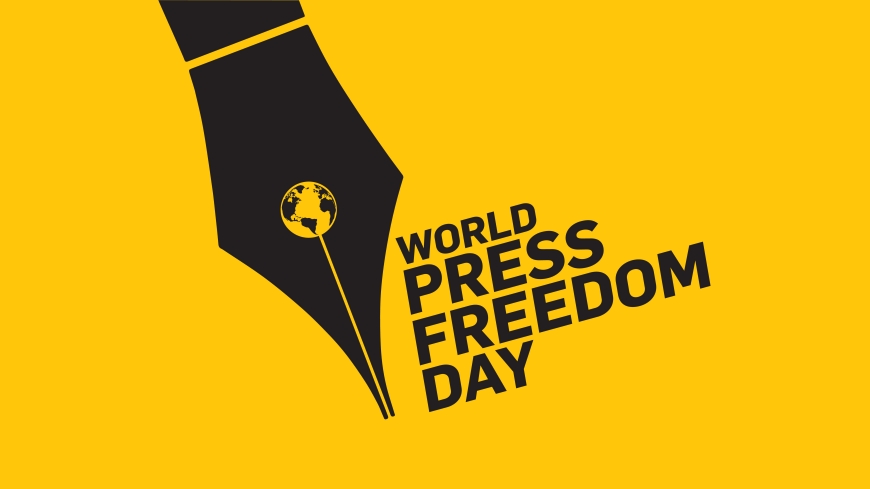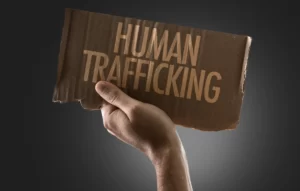
World press freedom day concept vector illustration. World Press Freedom Day or World Press Day to raise awareness of the importance of freedom of the press. End Impunity for Crimes against Journalism; Shutterstock ID 1719324568
STRATEGIC ASSESSMENT. Women journalists are vulnerable to gender-based violence in carrying out their journalistic duties, National Commission on Violence Against Women (Komnas Perempuan) member Veryanto Sitohang said.
The protection of female journalists while doing their job became an important agenda of the media companies under the supervision of the Press Council, he said. This is especially important given that Indonesia has Law No. 12/2022 on Sexual Violence Crime, he added.
Veryanto expressed hope that the Press Council will issue the Sexual Violence Reporting Guideline quickly, including for sexual violence prevention and handling and female journalist protection.
The Pusaka Bentala Rakyat Foundation (PUSAKA) released a report on Papuan human rights violations in 2022. The report identified several forms of violence, including the freedom of assembly and expression.
The Pusaka Foundation observed that protest-related incidents accounted for the majority of human rights violations in Papua. In the report presentation, Ambrosius Awalt from the Pusaka Foundation gave examples of cases they found, such as the use of treason articles against peaceful demonstrations by Papuans.
Indonesia ranked 108 out of 180 countries listed by Reporters without Borders in its 2023 World Press Freedom Index. While Indonesia’s ranking increased, from 117 in 2022, Alliance of Independent Journalists (AJI) Indonesia Secretary-General Ika Ningtyas said Indonesian journalists continue to face challenges, citing the 61 attacks on journalists recorded by the group.
According to Masduki, Associate Professor and researcher in the Department of Communication, Universitas Islam Indonesia, Yogyakarta, Konde.co, an alternative media site that actively reports on cases of sexual violence against women was hacked last October. This incident followed the media’s coverage of a rape case involving officials from the Ministry of Cooperatives and small and midsize enterprises (SMEs) in Jakarta.
Konde.co experienced a denial of service attack, also known as a DOS attack, which meant the public could not access the site. It was the second DOS attack on the non-profit news platform since it launched in 2016. It wasn’t the only site targeted, two weeks earlier a digital political news site called Narasi was also hacked. Not only was there a DOS attack, but several personal accounts belonging to the Narasi journalists were hacked and monitored.
There are no regulations that particularly protect the existence and guarantee the sustainability of digital and alternative journalism, against political power. Since 1999, Indonesia has had a press law which only regulates the sustainability of the press in general, and it strongly favours pro-government mainstream media, not alternatives. Initiatives to revise this law were not well received by the mainstream press and media activists, who are worried the results will actually worsen press freedom.
Indonesia is pursuing several initiatives to save news media companies. In the US there is a scheme to migrate hundreds of local print media that carry investigations from commercial to social (non-profit) institutions. Local media are entitled to subsidies from local authorities, assistance from philanthropic agencies and communities through subscriptions as a form of public appreciation.
Another solution is to strengthen local public broadcasters, combining them with local print media houses to promote local journalism. The yearly funds US authorities allocate to local public broadcasters can be shared with local newspapers through collaborative public journalism production.
Foreign Affairs Ministry Director Judha Nugraha said the Indonesian government had sent a diplomatic note to Myanmar’s Foreign Affairs Ministry as an effort to save dozens of Indonesian migrant workers who were victims of job scams of an online scam company in the country.
Judha said the ministry urged the Myanmar authorities to take effective steps to save 20 Indonesian citizens who were being held in Myawaddy. He said the Indonesian embassies in Yangon and Bangkok urged the Myanmar authorities to take effective steps to save Indonesian citizens.

According to Indonesian Foreign Affairs Ministry spokesperson Teuku Faizasyah, one of the issues the Indonesian government will bring up at the 2023 ASEAN Summit is trafficking in persons (TIP).
Faizasyah emphasized that fraudulent information and communication technology practices are becoming more prevalent in TIP cases in Southeast Asia. The ASEAN Leaders’ Declaration on Combating TIP Caused by Technology Abuse will make reference to this. The TIP issue has grown more challenging for the Indonesian government. As a result, regional management efforts must be coordinated.
The practice of hiring people from other countries to commit online fraud is on the rise, and social media and instant messaging apps are frequently used for this purpose. In order to stop this phenomenon from spreading further, the government is expected to take immediate action in real prevention and law enforcement.
Migrant Care Executive Director Wahyu Susilo described that throughout 2022, for example, the organization received complaints from 271 Indonesian citizens working in a number of countries, including Malaysia, Cambodia, the Philippines, Myanmar, Laos, Saudi Arabia, the United Arab Emirates, Iraq, and Libya.
Of that number, 189 Indonesian citizens reported being victims of trafficking in persons (TIP), or illegal recruitment, and were then placed to work as online scammers and gamblers. “The majority of hiring is done via online platforms like Facebook, Telegram, and WhatsApp.
According to Masduki, Associate Professor and researcher in the Department of Communication, Universitas Islam Indonesia, Yogyakarta, Konde.co, an alternative media site that actively reports on cases of sexual violence against women was hacked last October. This incident followed the media’s coverage of a rape case involving officials from the Ministry of Cooperatives and small and midsize enterprises (SMEs) in Jakarta.
Konde.co experienced a denial of service attack, also known as a DOS attack, which meant the public could not access the site. It was the second DOS attack on the non-profit news platform since it launched in 2016. It wasn’t the only site targeted, two weeks earlier a digital political news site called Narasi was also hacked. Not only was there a DOS attack, but several personal accounts belonging to the Narasi journalists were hacked and monitored.
There are no regulations that particularly protect the existence and guarantee the sustainability of digital and alternative journalism, against political power. Since 1999, Indonesia has had a press law which only regulates the sustainability of the press in general, and it strongly favours pro-government mainstream media, not alternatives. Initiatives to revise this law were not well received by the mainstream press and media activists, who are worried the results will actually worsen press freedom.
Indonesia is pursuing several initiatives to save news media companies. In the US there is a scheme to migrate hundreds of local print media that carry investigations from commercial to social (non-profit) institutions. Local media are entitled to subsidies from local authorities, assistance from philanthropic agencies and communities through subscriptions as a form of public appreciation.
Another solution is to strengthen local public broadcasters, combining them with local print media houses to promote local journalism. The yearly funds US authorities allocate to local public broadcasters can be shared with local newspapers through collaborative public journalism production.





